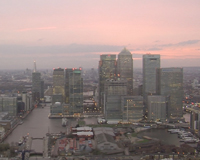September 2013 might just be the turning point. So far this month we have already heard talk of economic recovery, the UK turning a corner, things looking up. But good news is good news only if it is met with a proactive response. When it comes to serious hints at a healthier, more prosperous time ahead, we must ask what can be done to capitalise on the predicted recovery to make sure it continues, particularly in London. The chancellor should use his conference speech later this month to make bold commitments to ensure this fledgling recovery gains momentum.
Crane-filled skyline
If you look from the window of any tall building in central London, you will see the skyline dotted with cranes: a sign of development and a testament to London’s success. The inherent value of such development to the city itself – bringing work to professional services firms, construction jobs and, of course, new offices – is well documented.
But it also adds value to Britain on a wider scale. London benefits from office development – to the tune of about half a billion pounds annually in the centre. But the further contribution to regional economies is almost double that, at more than £1bn a year. Similarly, the 12,000 jobs supported in London are dwarfed by more than 22,000 supported outside the city.
Clearly we want to continue to encourage a good climate for businesses to operate in London. For that we need stable conditions in which to do business and a consistent tax regime. We do not want the uncertainty of an EU referendum taking place in a few years’ time. We need to get our immigration policy right, to be able to attract skilled migrants to come and work here and overseas students to study at our universities. We need to fix our air capacity problem to ensure that more flights can come in and out of London, and fly directly to more emerging markets.
Linked to this, we need to continue to invest in our creaking infrastructure. By 2030 there will be 10m people living in the capital. If people are the lifeblood of the city, then infrastructure forms the arteries. Unfortunately, much of our infrastructure dates back to Victorian times, and is straining under the demand.
Many projects are in the pipeline but closer examination shows that they are in limbo with no agreed timetable for delivery.
We need a clear timetable for the next phase of essential Tube upgrades, in particular the Piccadilly, Bakerloo and Central lines, and completion of the Northern Line extension from Kennington to Battersea. Agreement is required to build Crossrail 2, a new rail line running from London’s south-western suburbs, beneath central London and through and beyond north-east London. Additional passenger capacity on our inter-city network is essential, with HS2 an obvious example.
Links across the water
River crossings in the east of London are also important. There are three road crossings east of Tower Bridge compared with 16 at an equivalent distance west. But much of London’s future growth is planned for the east and growth won’t happen without better cross-river connections.
We must keep roads moving. Over the past 10 years, congestion on London’s roads has increased by around 10%. We need investment in technology at key junctions and new capacity. The mayor’s ?Roads Task Force recently published a report that listed a lot of worthy suggestions but had no “shovel-ready” delivery plan.
Finally, we cannot ignore housing. For London’s housing to keep pace with its population growth we will need to build more than 40,000 homes a year. We have not built that number since the Second World War. A step-change rise requires the government, the mayor and the boroughs to work together to put in place a supportive planning climate, bring public land into use, and enable the boroughs to use their assets to support new investment.
World-class infrastructure is vital to London. We urge ?the chancellor to carry on investing in London, which ?in turn is an investment ?in the UK.
Jo Valentine will be speaking at The London Property Summit on Thursday 17 October www.thelondonpropertysummit.com
Baroness Valentine is chief executive of London First











